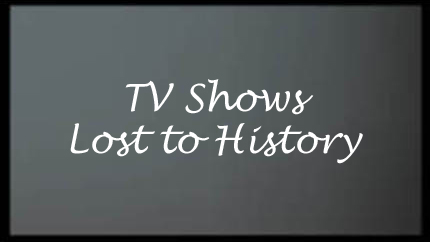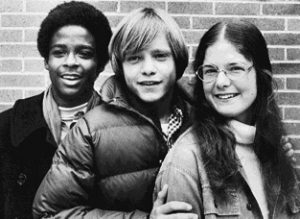Although it’s still technically the same show, just with a new name, the 10 episodes known as “James at 16” (1978, NBC) divert from the 11 previous episodes known as “James at 15” enough to be analyzed separately.
A logical continuation
Creator/executive producer Dan Wakefield departed the series in the midst of production of the first “James at 16” episode, “The Gift,” because the network objected to James referencing “protection” before having sex with his girlfriend of the week, Christine. Apparently NBC was concerned about offending Catholic viewers, marking this as the last point in pop-culture history where protected sex was controversial enough to be censored from a TV drama.
One might think the “James at 16” episodes would be stiff and conservative from that point forward – and, indeed, it is less well-regarded than “James at 15.” However, Ronald Rubin – one of the best writers from “James at 15” – took over as executive producer, and these episodes feel like a logical continuation of the show.

“James at 16” (1978)
NBC, 10 episodes
Creator: Dan Wakefield
Stars: Lance Kerwin, Linden Chiles, Lynn Carlin
Brushed aside
Unfortunately, there’s not much forward progress to go with the name change, and it takes a step backward in some ways. I like how James (Lance Kerwin) and Sly (David Hubbard) become even tighter buddies, but in about half the episodes, Marlene (Susan Myers) is absent or outside of the group, and the show pushes James’ dad, mom and sisters to the back burner (older sister Kathy doesn’t even appear in these episodes).
James sometimes seems more mature, perhaps because Kerwin had matured physically and as an actor, and perhaps because James’ eye goes to the occasional brunette or redhead now along with his flock of blondes. But the structure is the same: James is confronted with an issue, he bungles it, and then learns a lesson (except on rare occasions when he’s in the right from the start).
While a wide range of issues is covered, there aren’t any episodes that stand out from the pack due to fascinating storytelling; none are great, none are terrible. Overall, “James at 16” is a slight step down from “James at 15,” but not so much that it’s a disgrace to Wakefield’s vision.
Here are my rankings of the 10 episodes of “James at 16” (episodes 12-21 of the overall series):
1. “The Blowout” (episode 13, written by Wally Dalton, Shelley Zellman and Mara Lideks)
I like this episode because the issue-of-the-week is small (James is self-conscious about being short after a tall girl declines to date him) but it feels like the biggest thing in the world to the obsessive James. In the end, James and the tall girl dance together anyway, not caring if they look funny (I wonder if “Freaks and Geeks” was inspired by this moment).

This also marks an early example of cross-promotion, as James says to dance organizer Marlene: “Hey, isn’t that England Dan & John Ford Coley? They’re big stars. How’d you get them?” In addition to performing “I’d Really Love to See You Tonight” at the dance, they provide the new theme song (which sounds kind of like a Mentos commercial and is just as much of an earworm as the original).
2. “An Hour Before Midnight” (16, Ronald Rubin and Nancy Sackett)
A strong turn by Rosanna Arquette as teenage alcoholic Karen is the highlight. It’s interesting to note that her problems don’t just come from drinking, but also from the fact that Karen’s offscreen parents don’t think alcoholism is a serious problem, reflecting the general attitude of the time. James discovers that just being there for Karen isn’t enough. Marlene notes that she has an alcoholic brother and believes “normal people want to live at all costs; alcoholics want to die.”
3. “Knocking Heads” (17, Dusty Kay and Bill Nuss)
This briefly shows signs of being “James at 16’s” answer to “My So-Called Life’s” “The Substitute,” about an inspiring teacher who is run out of town. It falls short, but the script bobs and weaves and makes us wonder what’s up with this football coach/history teacher (Charles Hallahan, in a nice guest turn).
Coach Goth truly seems to care about turning his boys into men, but his teaching style (dates and facts only, no opinions) is mind-numbing, and he’s also a compulsive liar. James’ lesson of the week seems to be that some humans are so pathetic that you shouldn’t do anything to make their life worse, even if that person is hurting others. It’s a muddled message, but its untidiness makes it stand out on this series.
4. “Listless Fever” (14, Bud Freeman)
In a sequel to the controversial “The Gift,” James thinks he has VD in this hour that aims to highlight the fact that – as the health teacher says – “venereal disease has reached epic proportions in your age group.” The series’ most “After-School Special”-style episode nonetheless nicely captures James’ panic over his symptoms, his need to find a free clinic so his parents won’t know he had sex, the logistical nightmare of calling Christine in Sweden (he needs to scrounge together $11.40 for a three-minute call), and the way teenagers giggle and joke during a health-class filmstrip.
5. “Champions” (15, Dalton and Zellman)
This fascinating time-capsule episode explores girls basketball players who want to play by boys’ rules, so they form a team to take on the boys intramural champions, which includes James and Sly. In the 1970s, varsity girls basketball existed, but with a completely different set of rules premised on the idea that girls can’t run full-court for a full game. While Marlene doesn’t get enough attention in “James at 16,” she is a strong character when she’s on screen. Moving on from being a scientific observer of humanity, she often fights for the rights of oppressed groups, as she does here by organizing the girls.
6. “Ducks” (20, Martin Zweiback)
This is the most “different” episode of “James at 16” due to its quasi-comical scenes of James and Sly hiding boxes full of ducks that they’ve duck-napped from a city park that’s about to be razed. As in “Kathy’s in the Shower,” Paul’s beliefs are challenged when one of his kids acts on them.
He tells James he believes in civil disobedience, then changes his tune when he sees his son could get in trouble. It’s a bit idealistic that the judge lets Miss Jordan – the kids’ older, duck-loving ally – off the hook because her heart is in the right place. But adding a bit of reality to the situation, Miss Jordan fears the kids may have let these domestic ducks loose in a lake where they will die.
7. “Hunter Country” (19, April Smith)
“Election” this ain’t, but it works as a straightforward analysis of political campaigns. James initially wants to be in a position to change the school’s bad policies – including warrantless locker searches, something that’s still very much an issue today (although the courts seem to have decided students have no protections in this regard) – but then he just wants the power of being class president. When he instead endorses Marlene – thus giving her the presidency and burying the hatchet – it’s a nice moment in this friendship that the writers mostly neglect in these 10 episodes.
8. “The Gift” (12, Rubin and Dan Wakefield)
Not as good as it is famous, the episode where James loses his virginity to Swedish exchange student Christine (yes, “James at 16” beat “American Pie” to the punch) is interesting for its historical context. Wakefield wanted James to use protection, and the network rejected that idea for fear of offending some viewers.
A Swedish student, rather than an American girl, was used to further dodge criticism. And a scene in Ernie’s Sub Shop where Sly talks to James about the dangers of VD is awkwardly cut, presumably to take out Sly’s references to condoms. But actually, James not using protection – and later facing the possibility that Christine is pregnant – fits with the show’s action-and-consequence structure, and it makes the superior “Listless Fever” possible.
9. “Queen of the Silver Dollar” (21, Dalton and Zellman)
Ultimately, this story of James hurting a girl’s feelings is too one-note, but it’s intriguing early on because I thought this girl from a rival town is purposely keeping James up all night so he’ll perform poorly at the next day’s swim meet. As it turns out, it’s about how James just wants to win a bet for “two big ones” (yes, $2) that he can bring a girl back to the motel, while sweet-but-dull Emmy actually likes him. It’s an appropriate final lesson about the importance of considering the big picture, but it’s also unsatisfying to see that James hasn’t particularly grown over the course of 21 episodes.
10. “Rebel without a Car” (18, Steven J. Tramz)
This ends up being a straightforward “James steals the family car” story, with an interestingly off-tone color where Paul gets even more furious at his son over this than any previous discretion, including running away to the West Coast (which James did twice in “James at 15”).
A much better episode is hinted at in the opening act, when nerdy kid Dean – whose van James hopes to borrow – can’t land a date: “I couldn’t get a date in a women’s prison with a fistful of pardons,” he laments. Then it takes a wrong turn when James’ and Sly’s dates make fun of Dean and he drops out of the episode; we miss a chance for Dean to meet his female equivalent, and to figure out how he landed dates with Marlene (“Actions Speak Louder”) and Julie (“The Blowout”) in previous episodes.

This blog post is part of a series about great short-lived TV shows that haven’t been released on DVD or digital or streaming services, and are rarely – if ever — shown in syndication. While some of these shows can be found somewhere on the Internet, fans of great TV want to see them get a proper release. If you’re one of those fans, your best bets are to vote for the show at TVonDVD.com or to request information from Amazon.com in the event the show gets released. This will let the copyright holder know of your interest.
Main image: NBC publicity photo

